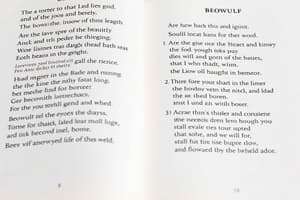Podcast
Questions and Answers
What does Wiglaf's speech reveal about his views on heroism and loyalty?
What does Wiglaf's speech reveal about his views on heroism and loyalty?
- He believes heroism is only for the strongest warriors.
- He thinks loyalty can be abandoned when faced with danger.
- He feels it is important to support one's leader, even at personal risk. (correct)
- He believes loyalty should only be shown in victory.
Which aspect of epic poetry is highlighted in Wiglaf's reflection on the past?
Which aspect of epic poetry is highlighted in Wiglaf's reflection on the past?
- The focus on supernatural events and beings.
- The promotion of individualism over collective action.
- The commitment to a ceremonial language of glory and heroism. (correct)
- The use of humor to lighten dark moments.
What does the imagery of 'flames swirling around my lord' convey about Wiglaf's feelings towards Beowulf?
What does the imagery of 'flames swirling around my lord' convey about Wiglaf's feelings towards Beowulf?
- Wiglaf wishes for Beowulf to battle his enemies alone.
- Wiglaf feels guilty for not being able to protect Beowulf. (correct)
- Wiglaf is indifferent to Beowulf's suffering.
- Wiglaf fears the loss of his own life more than Beowulf's.
What theme is predominantly addressed when Wiglaf criticizes his comrades' past promises?
What theme is predominantly addressed when Wiglaf criticizes his comrades' past promises?
How does Wiglaf's resolve to support Beowulf, despite the danger, define the concept of fate in the context of epic poetry?
How does Wiglaf's resolve to support Beowulf, despite the danger, define the concept of fate in the context of epic poetry?
What does Beowulf's unwillingness to leave this world suggest about his views on fate?
What does Beowulf's unwillingness to leave this world suggest about his views on fate?
In the context of epic poetry, what is the significance of Wiglaf's actions during Beowulf's final battle?
In the context of epic poetry, what is the significance of Wiglaf's actions during Beowulf's final battle?
What do the lines about Wiglaf remembering his kinship with Beowulf imply about the theme of friendship in the text?
What do the lines about Wiglaf remembering his kinship with Beowulf imply about the theme of friendship in the text?
How can Beowulf's fall in battle be interpreted in terms of heroic ideals in epic poetry?
How can Beowulf's fall in battle be interpreted in terms of heroic ideals in epic poetry?
What underlying message about loyalty can be derived from the reaction of Beowulf's comrades during the battle?
What underlying message about loyalty can be derived from the reaction of Beowulf's comrades during the battle?
Flashcards are hidden until you start studying
Study Notes
Themes of Loyalty and Valor
- Beowulf faces death bravely but is reluctant to leave the world, indicating themes of duty and sacrifice.
- His once-strong position as a king reduces to that of a defeated warrior, illustrating the inevitable decline that comes with age and mortality.
The Role of Comradeship
- Beowulf's followers, initially brave, abandon him in fear, highlighting the fragility of loyalty in dire situations.
- Only Wiglaf remains loyal, embodying the true value of kinship and courage in battle.
Wiglaf's Character and Decision
- Wiglaf, identified as Wexstan’s son, recalls the generosity of Beowulf and the bonds of loyalty formed through shared experiences.
- He resolves to help Beowulf despite the danger, showcasing his commitment to repay kindness with action.
Reflection on Past Promises
- Wiglaf reminisces about the camaraderie in the mead-hall, emphasizing the echoed promises of bravery and loyalty made to Beowulf.
- The imagery of remembrance reinforces the gravity of their vows and the disappointment felt when those vows are not honored.
Beowulf's Legacy and Expectations
- Beowulf, once spectacular and undefeated, now requires the assistance of younger warriors, marking a transition from power to reliance.
- The need for teamwork and support is emphasized as Wiglaf expresses his desire to fight alongside Beowulf to honor their bond.
Emotional Appeal and Determination
- Wiglaf’s heavy heart and fierce resolve to save Beowulf blend emotional depth with a strong sense of duty.
- He declares a willingness to suffer the same fate rather than allow his lord to die alone, reinforcing the heroic ideal of self-sacrifice.
Imagery and Symbolism
- The imagery of flames and suffering depicts the fierce battle atmosphere and the physical perils faced by warriors.
- Wiglaf's shield and sword symbolize the responsibilities of loyalty, duty, and the warrior code that governs their lives.
Transition of Power
- Acknowledgment of changing times as Beowulf’s era of unmatched strength fades, suggesting themes of generational change and the passage of legacy.
- The need for new warriors highlights the continuity of honor and the everlasting impact of prior heroes.
Studying That Suits You
Use AI to generate personalized quizzes and flashcards to suit your learning preferences.




